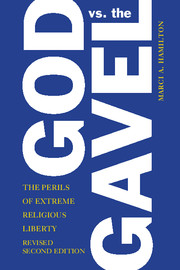Book contents
- Frontmatter
- Contents
- Acknowledgments
- Preface to the Second Edition
- Introduction: The Wages of RFRA
- Part One Religious Liberty is not a License to Harm Others
- 1 The Problem
- 2 Children
- 3 Marriage
- 4 Religious Land Use and Residential Neighborhoods
- 5 Schools
- 6 The Prisons and the Military
- 7 The Right to Discriminate
- Part Two The History and Doctrine Behind Common-Sense Religious Liberty
- Epilogue: Follow the Money
- Foreword to the 2005 Edition
- Notes
- Index
7 - The Right to Discriminate
Published online by Cambridge University Press: 05 November 2014
- Frontmatter
- Contents
- Acknowledgments
- Preface to the Second Edition
- Introduction: The Wages of RFRA
- Part One Religious Liberty is not a License to Harm Others
- 1 The Problem
- 2 Children
- 3 Marriage
- 4 Religious Land Use and Residential Neighborhoods
- 5 Schools
- 6 The Prisons and the Military
- 7 The Right to Discriminate
- Part Two The History and Doctrine Behind Common-Sense Religious Liberty
- Epilogue: Follow the Money
- Foreword to the 2005 Edition
- Notes
- Index
Summary
“Discrimination” is a dirty word, and discrimination by religious entities is counterintuitive when one is inclined to believe that religion is always a force for good. Religious entities have had a prickly relationship with the anti-discrimination laws. Many hold views or choose clergy according to criteria that contravene civil rights laws: sometimes the religious entity wins, sometimes not.
Race discrimination has been particularly difficult for religious entities to achieve without consequences. For example, Bob Jones University, which prohibited interracial dating, was notified by the Internal Revenue Service that its tax-exempt status would be revoked because of its violation of the federal civil rights laws prohibiting racial discrimination. The university argued vigorously that it was a private organization that should be able to believe anything, and that tax-exempt status should not turn on its views on racism. At the Supreme Court, the University was supported by the American Baptist Churches, Center for Law and Religious Freedom of the Christian Legal Society, the National Association of Evangelicals, and Congressman Trent Lott (R-Miss.). The Supreme Court rejected their arguments, saying that “the Government has a fundamental, overriding interest in eradicating racial discrimination in education.…That governmental interest substantially outweighs whatever burden denial of tax benefits places on petitioners’ exercise of their religious beliefs.” Taxation is not the only arena wherein religious institutions are forbidden to discriminate on the basis of race. A religious organization that is selling, renting, or limiting the occupancy of property (in a noncommercial context) may choose to deal only with those who share the same religion, unless membership “is restricted on account of race, color, or national origin.”
- Type
- Chapter
- Information
- God vs. the GavelThe Perils of Extreme Religious Liberty, pp. 219 - 236Publisher: Cambridge University PressPrint publication year: 2014



